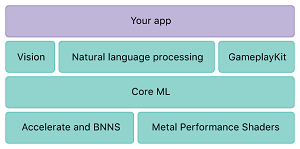Cutting-edge technologies such as augmented reality and machine learning highlighted Apple's mobile app development efforts revealed at the ongoing Worldwide Developers Conference.
Here's a look at some of the major mobile dev announcements made during the show, which concludes on Friday:
ARKit for Augmented Reality
The mobile dev world woke up to the possibilities of augmented reality (AR) during last summer's Pokémon Go craze. To further the movement on the iOS platform, Apple introduced ARKit.
"iOS 11 introduces ARKit, a new framework that allows you to easily create unparalleled augmented reality experiences for iPhone and iPad," Apple's site says. "By blending digital objects and information with the environment around you, ARKit takes apps beyond the screen, freeing them to interact with the real world in entirely new ways."
 [Click on image for larger view.]
ARKit (source: Apple)
[Click on image for larger view.]
ARKit (source: Apple)
Apple demonstrated advanced capabilities of its AR platform, such as lifelike light sources and shadows being rendered as objects are moved around in an app.
"ARKit allows developers to tap into the latest computer vision technologies to build detailed and compelling virtual content on top of real-world scenes for interactive gaming, immersive shopping experiences, industrial design and more," the company said in a news release.
Apple said its AR software innovations are made possible by its advanced iPhone and iPad hardware, which provide CPU and GPU computing power, cameras and motion sensors. "When you bring the software together with these devices, we actually have hundreds of millions of iPhones and iPads that are going to be capable of AR," exec Craig Federighi said in a presentation. "In fact, that's going to make, overnight, ARKit the largest AR platform in the world."
For more information, read the ARKit documentation.
Core ML for Machine Learning
With machine learning about to become pervasive in software development of all kinds, Apple highlighted its Core ML, "a new foundational machine learning framework used across Apple products, including Siri, Camera, and QuickType" that comes with iOS 11.
With just a few lines of code, Apple said, iOS developers can easily integrate machine learning models into their apps to provide intelligent features.
 [Click on image for larger view.]
Core ML (source: Apple)
[Click on image for larger view.]
Core ML (source: Apple)
"Core ML is the foundation for domain-specific frameworks and functionality," Apple said. "Core ML supports Vision for image analysis, Foundation for natural language processing (for example, the NSLinguisticTagger class), and GameplayKit for evaluating learned decision trees. Core ML itself builds on top of low-level primitives like Accelerate and BNNS, as well as Metal Performance Shaders."
Developing with the Core ML framework involves obtaining a Core ML model, integrating it into an app, converting trained models that might come from third-party machine learning tools into the Core ML format and then programming with the Core ML API to support custom workflows and advanced use cases.
A machine learning trained model is developed through the application of a machine learning algorithm against a set of training data, allowing it to make predictions based on new data that is processed.
"In addition to supporting extensive deep learning with over 30 layer types, it also supports standard models such as tree ensembles, SVMs, and generalized linear models," the product site says. "Because it’s built on top of low level technologies like Metal and Accelerate, Core ML seamlessly takes advantage of the CPU and GPU to provide maximum performance and efficiency. You can run machine learning models on the device so data doesn't need to leave the device to be analyzed."
The framework includes the Core ML Tools Python package, which the company said can be used to convert models from ML toolboxes into the framework's format.
For more information, read the Core ML documentation.
All-New App Store
Apple this week announced an all-new App Store, which it said has been redesigned from the ground up with new features such as the Today tab.
"The Today tab is a daily destination with original stories from our editors around the world, featuring exclusive premieres, new releases, a fresh look at our all-time favorites, an App of the Day, a Game of the Day, and more," Apple said. "Stories share Apple’s unique perspective on apps and games and how they impact our lives, using artwork, videos, and developer quotes to bring your apps to life."
Apple also said the App Store features new dedicated experiences for apps and games and a deeper product page experience that lets developers showcase their apps with more app previews, localization and new text fields.
Also new are more capabilities for promoting in-app purchases. "Now customers can discover and buy your in-app purchases directly on the App Store, helping your app’s content gain exposure and engagement even before your app is downloaded," the company said. "You can promote up to 20 in-app purchases, including subscriptions, on your app's product page. They can also appear in search results and may be featured by our editorial team."
App Store search capabilities have also been enhanced with expanded results and a redesigned UI that is supposed to make a developer's content more discoverable. The new App Store will be available this summer for users of the iOS 11 beta.
- Updated App Store Review Guidelines
"The App Store Review Guidelines have been updated," Apple announced. "We review all apps submitted to the App Store in an effort to determine whether they are reliable, perform as expected, and are free of offensive material. As you plan and develop your app, make sure to use these updated guidelines."
The guidelines are arranged into five sections: Safety, Performance, Business, Design and Legal.
Two points that developers should take special notice of include:
- "We will reject apps for any content or behavior that we believe is over the line. What line, you ask? Well, as a Supreme Court Justice once said, 'I'll know it when I see it'. And we think that you will also know it when you cross it."
- "If you attempt to cheat the system (for example, by trying to trick the review process, steal user data, copy another developer's work, or manipulate ratings) your apps will be removed from the store and you will be expelled from the Developer Program."
Stay tuned for more developer news coming out of WWDC in San Jose, Calif., which runs for two more days after today.